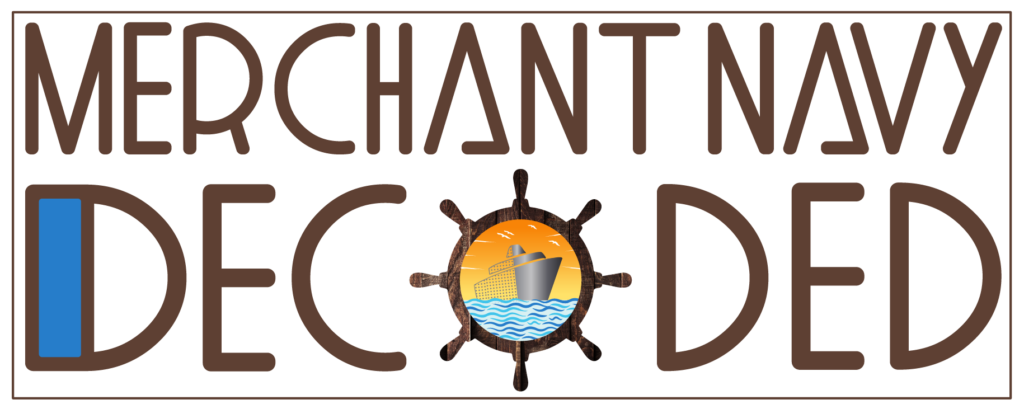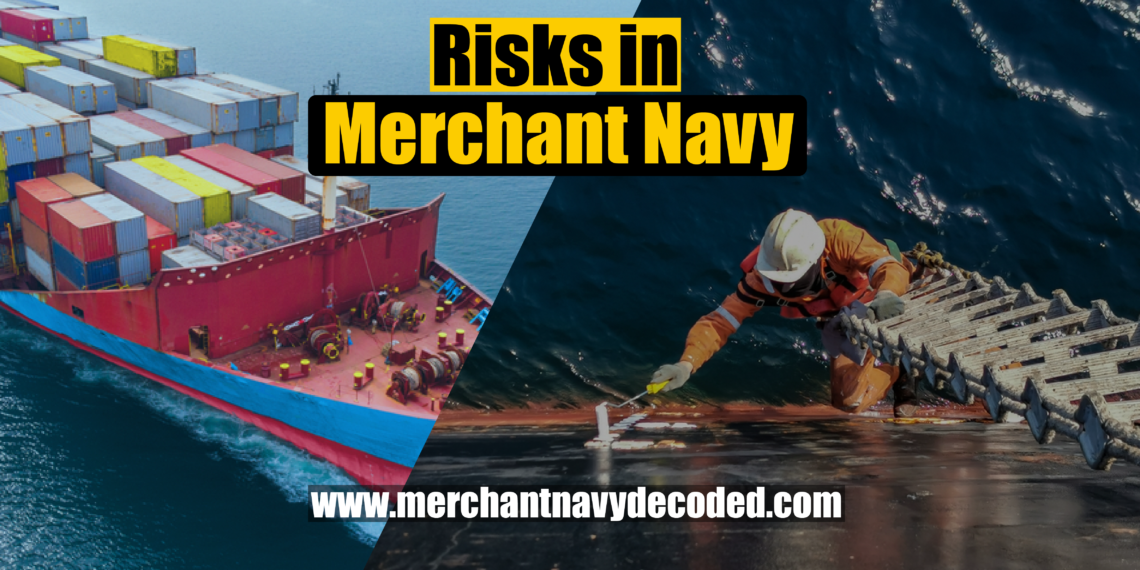Risks in Merchant Navy
Merchant Navy for long has been a very delusive field in our country, with more myths and misconceptions associated with it rather than actual facts. In recent years there has been a significant surge in interest in this field. Due to social media , Merchant Navy is now portrayed as a very glamorous career living up to its age-old definition of being a field filled with wealth, women, and wine. But, don’t get blinded by this, the shipping industry is filled with risks and challenges that can test even the toughest of men/women. Apart from the physical and mental strain, there are many physical hazards associated with this field.

If any of you have had the opportunity of interacting with an active seafarer then the narrative that you’ll get from them about this profession will be completely different than what you see on social media. And once you go onboard you will realize that it is nothing like what it seems from the outside.
You have to be on your toes all the time while working onboard, it takes only one wrong move, one split-second decision that can change your life for the worse. In this blog, we list some of the biggest risks associated with shipping.
Mooring Operation

This is one of the most dangerous operations carried out on board and also the reason for many accidents. Every year several officers and ratings lose their lives or end up with severe injury due to this operation. Mooring operation requires immense knowledge and expertise in handling mooring ropes in order to carry out the operation effectively. The term mooring means the procedure to make fast a ship with a fixed or floating object (jetty, pier, ship, barge, buoy, etc.) to hold them together for various cargo operations. Mooring ropes are not like any other regular rope, these ropes can cause a lot of damage to the ship and the crew if they are not maintained and handled properly.
The following points must be followed in order to avoid hazards while carrying out mooring operations –
- Always carry out a “toolbox meeting” before any mooring/unmooring operation.
- Always follow the agreed mooring sequence.
- Always keep clear of snap-back zones. A snapback zone on a mooring area is the area where it is anticipated that a failed mooring line could recoil with great velocity, resulting in a severe injury or even death in some cases.
- Inspect the condition of the mooring lines before using them, if their condition is below par, scrap them.
- If you’re caught in a hazardous situation, stand back or stop the operation. There should be no miscommunication between the deck crew and the terminal crew.
- Always keep well clear of rope bights.
Enclosed Space Entry

Enclosed space means a confined space that is not gas freed and has several pockets of toxic and flammable gases. This is once again a very common type of accident on a ship. Many officers and ratings get so used to entering enclosed spaces that they completely ignore safety procedures to be followed before entering an enclosed space. The most common confined spaces onboard are cargo holds/tanks, chain lockers, cofferdams, fuel tanks, void spaces, engine crankcase, duct keel, etc.
Although entering dangerous confined spaces onboard is not advisable but sometimes the ship’s crew has to enter enclosed spaces for reasons such as – inspection of tanks (ballast tanks & double bottom tanks), cleaning of tanks or holds, maintenance including painting, repairing, etc.
Risks associated with Enclosed Space Entry
- Oxygen Deficiency
The range of oxygen in an enclosed space should be between 19.5% – 23.55% to be considered safe for entry. The level of oxygen can drop in an enclosed space for many reasons such as rusting of steel, entry of inert gases, activities such as hot work, welding, etc.
- Toxic Vapours
The presence of hazardous vapours can be really dangerous and fatal even if the space is oxygen-enriched. Inhalation of toxic vapours can cause eye irritation, headache, impairment of judgment, unconsciousness, and even death.
- Little/No Ventilation
This could lead to the presence of toxic gases and oxygen deficiency both fatal for man-entry.
- Limited Space
Restricted or limited space can make rescue operations really difficult. Crew members should be aware of the construction of the enclosed space before entering.
Man Overboard

Man overboard is a situation in which a crew member falls overboard into the water while working on deck or due to some other circumstances. Although everyone on board is properly trained on how to deal with such situations, still sometimes rough weather can hamper the rescue operation. At times extreme water temperature in some places can be a huge problem as it can lead to fatal conditions such as hypothermia. In the past, there have been several incidents in which the ship’s personnel have lost their lives due to this.
Electrocution

This is another major cause of accidents onboard. Improper handling of electrical connections, exposed wires, and ignoring basic safety precautions while handling electrical equipment can lead to electrocution which can even cause death at times.
Hot Work

The term hot work means any activity or process that generates a source of ignition, this could be through flame, heat, or spark. The most common reason due to which accidents occur in most ships is when hot work is being carried out in an enclosed space that contains flammable gases, or when flammable gases are present in the adjacent tank. Most of the accidents happen due to the negligence of seafarers to follow basic hot work procedures.
Piracy

Though the cases of pirate attacks on merchant ships have gone down in recent years. But still, it poses a great threat to the lives of crew members onboard, especially while transiting through High-Risk Areas (HRA) such as Benin, Nigeria, Somalia, Gulf Of Aden, Malacca Strait, Bangladesh, Indonesia, etc. These pirates often use weapons such as RPGs and guns at the ship’s crew and there have been many cases of violent attacks by pirates, where they have hijacked the vessel, killed some of the crew members, and looted the vessels.
So, now you guys know that life on board merchant ships is not as easy as it seems from the outside, it involves working under hazardous conditions while taking the maximum possible precautions in order to minimize the chances of an accident. The purpose of this blog is not to discourage you from your quest of pursuing a successful career at sea, but to make you aware of the risks associated with this field.
“Living with fear stops us from taking risks, and if you don’t go out on the branch, you are never going to get the best fruit.”
Sarah Parish
Disclaimer :- The opinions expressed in this article belong solely to the author and may not necessarily reflect those of Merchant Navy Decoded. We cannot guarantee the accuracy of the information provided and disclaim any responsibility for it. Data and visuals used are sourced from publicly available information and may not be authenticated by any regulatory body. Reviews and comments appearing on our blogs represent the opinions of individuals and do not necessarily reflect the views of Merchant Navy Decoded. We are not responsible for any loss or damage resulting from reliance on these reviews or comments.
Reproduction, copying, sharing, or use of the article or images in any form is strictly prohibited without prior permission from both the author and Merchant Navy Decoded.



Merchant navy job is best job for me
This contractual agreement job is not best for 75% people ok.
Nice vlog
That is informative
Hope it helped!
Thank you for the Valuable Information Sir.
Pleasure is ours, stay connected for more such information.
I need
Join me
For any queries related to Merchant Navy, information and guidance, WhatsApp us at +91 7417349336.
Great one 🙌🙏
Thanks Ishika
For-GS